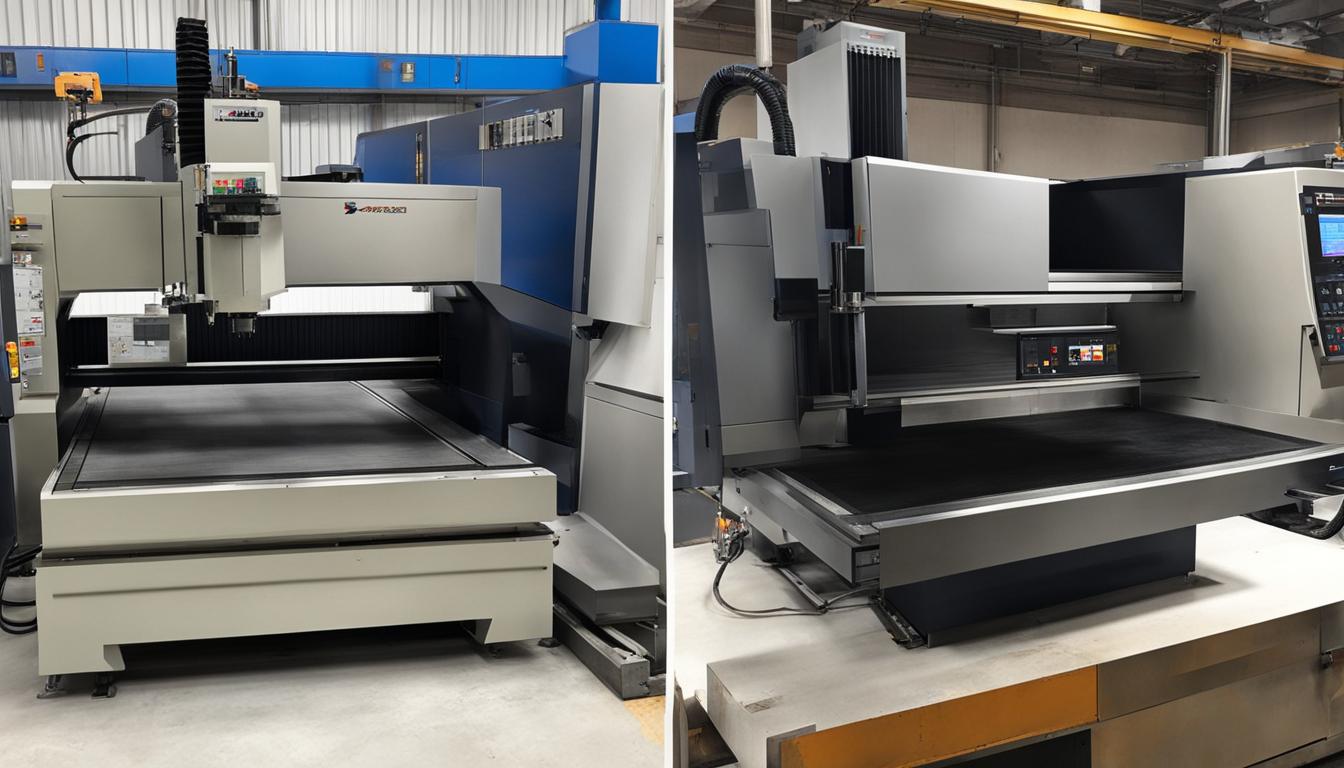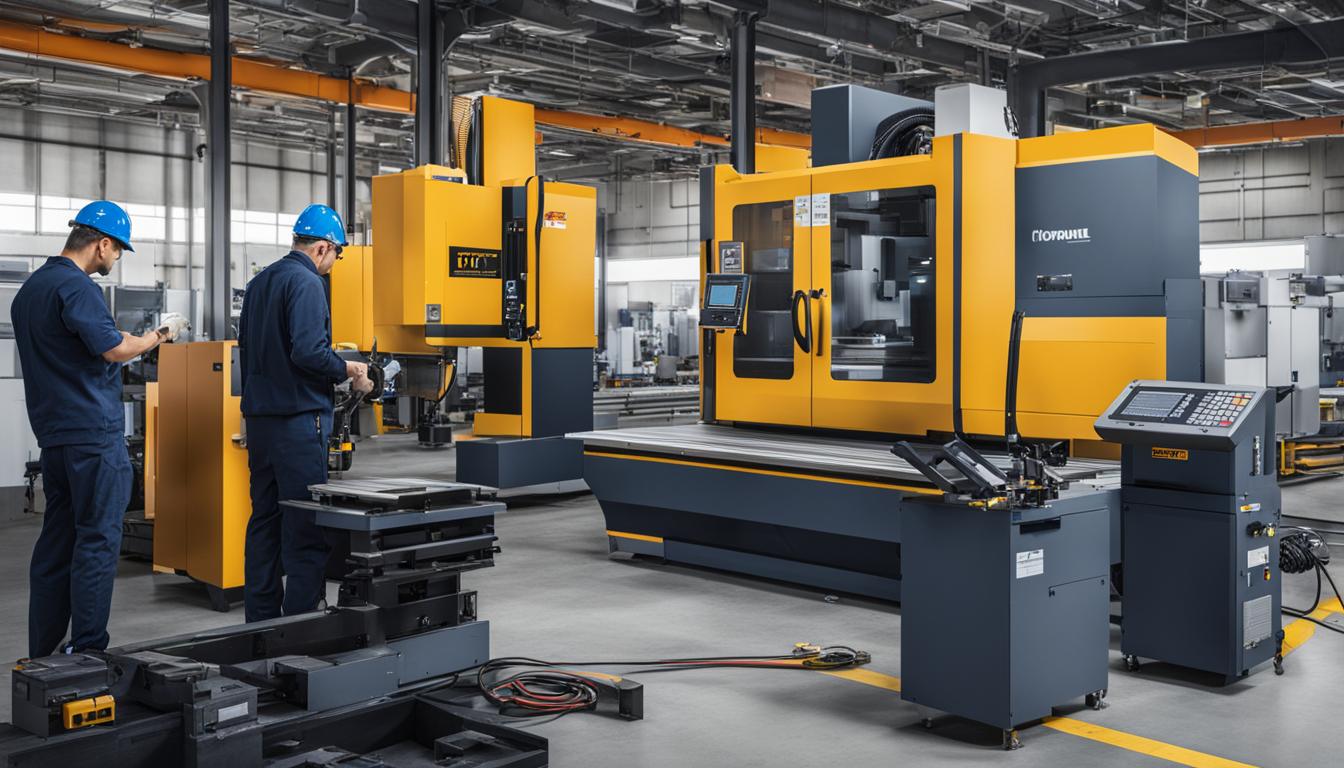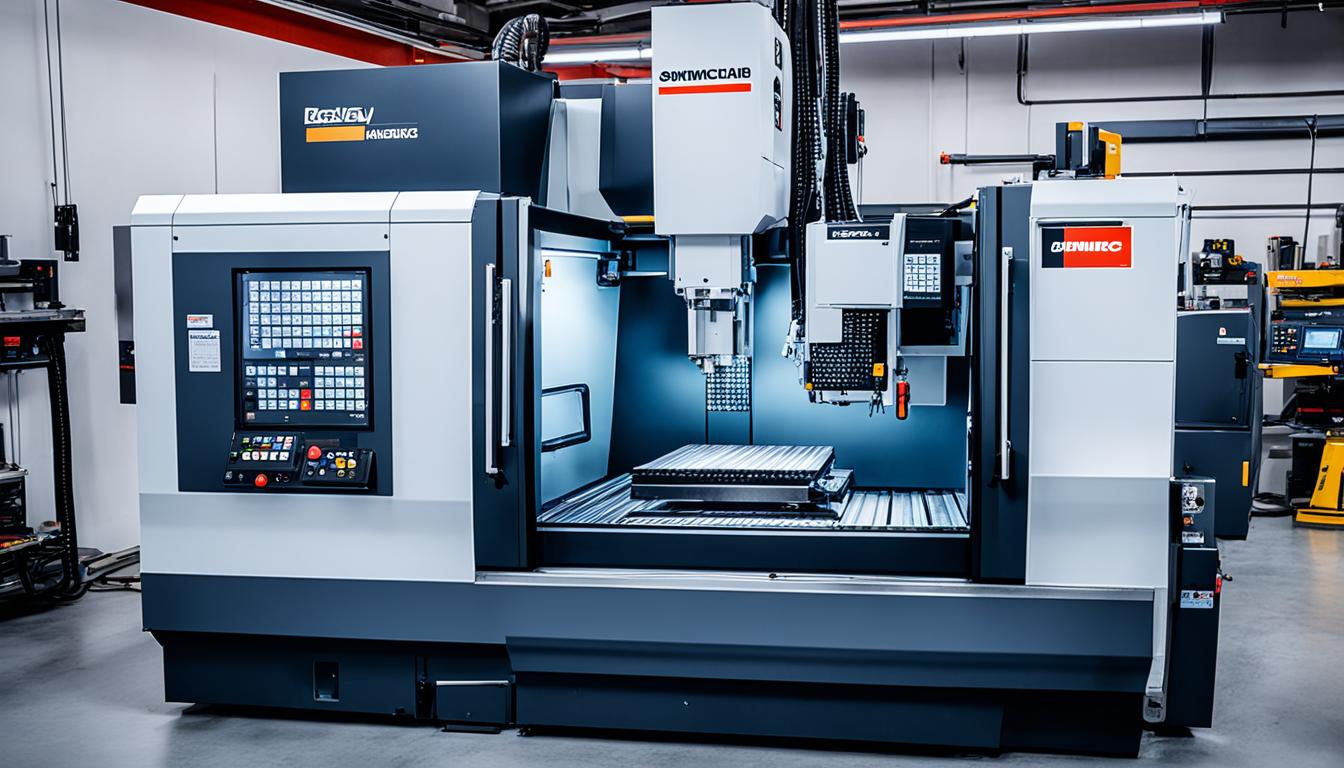The cost of a used CNC machine can vary significantly, typically ranging from $5,000 to $100,000 or more, depending on factors such as age, condition, brand, size, and capabilities. Smaller, older, or less complex machines may be available for $5,000 to $25,000, while larger, more recent, or more advanced models can cost $30,000 to $100,000+. Desktop CNC machines for hobbyists or small businesses might be found for as low as $1,000 to $5,000.
The type of CNC machine also influences price, with routers generally being less expensive than mills or lathes. Buyers should consider additional costs such as transportation, installation, tooling, and potential repairs or upgrades when budgeting for a used CNC machine. Purchasing from reputable dealers or auctions can provide more assurance of machine quality and may include warranties or support services.
Thorough inspection and testing of the machine before purchase is crucial to ensure its functionality and avoid costly surprises. While used CNC machines can offer significant savings compared to new models, it’s essential to balance the initial cost savings against potential maintenance and productivity concerns.
- The cost of a used CNC machine can vary depending on factors such as machine type, brand, age, condition, and included features.
- Entry-level CNC machines can start around $2,000 to $5,000, while high-end machines can reach several million dollars.
- Research and compare prices to get an understanding of the average cost range for the type of used CNC machine you’re interested in.
- Factors such as machine type, size, software and hardware used, and manufacturer influence the overall cost of a CNC machine.
- Consider the pros and cons of buying new or used CNC machines to make the best decision for your needs and budget.
Factors Influencing CNC Costs
When it comes to the cost of CNC machines, several factors come into play. These factors can greatly influence the price you can expect to pay for a CNC machine. By understanding these factors, you can make an informed decision and find the right CNC machine that aligns with your budget and requirements.
Type of Machine
The type of CNC machine you choose will have a significant impact on its cost. There are various types of CNC machines available, including milling machines, lathes, routers, and plasma cutters. Each type caters to specific applications and industries. Generally, larger and more complex machines, such as machining centers or multi-axis CNC machines, tend to be more expensive compared to smaller or simpler machines.
Size and Complexity
The size and complexity of a CNC machine can also affect its cost. Larger machines require more materials and components, resulting in a higher price tag. Additionally, complex machines that offer advanced features and capabilities often come at a premium. The level of precision, speed, and automation provided by the machine will also impact its cost.
Software and Hardware
The software and hardware used in a CNC machine play a crucial role in its functionality and overall cost. High-quality software and hardware can enhance the machine’s performance and capabilities but may contribute to a higher price. Advanced software with user-friendly interfaces and powerful features can significantly improve your workflow and productivity.
Manufacturer
The manufacturer of the CNC machine can influence its cost as well. Different manufacturers have their pricing structures, depending on factors such as brand reputation, quality, customer support, and additional services offered. It’s essential to research and compare different manufacturers to find the best balance between cost and quality for your specific needs.
In conclusion, factors such as the type of machine, size and complexity, software and hardware, and the manufacturer all contribute to the cost of a CNC machine. Understanding these factors can help you make an informed decision and find a CNC machine that meets your budget and project requirements.
New vs Used CNC Machines
When considering purchasing a CNC machine, one of the primary decisions to make is whether to buy a new or used machine. Each option has its own set of pros and cons, and it’s essential to weigh them before making a decision.
Pros of Buying New CNC Machines
- New machines come with the latest technology, ensuring optimal performance and efficiency.
- Manufacturers provide full warranties, offering peace of mind and protection against potential issues.
- Customer support from the manufacturer is readily available, making it easier to address any concerns or difficulties.
Cons of Buying New CNC Machines
- New machines are typically more expensive compared to used machines, which may be a deterrent for those on a tight budget.
- Upgrading or adding new features to a new machine can come with additional costs.
Pros of Buying Used CNC Machines
- Used machines are generally less expensive than new ones, making them a cost-effective option for small businesses or hobbyists.
- Despite being pre-owned, many used machines can still offer reliable performance and productivity.
- Used machines may have the added benefit of being already fully equipped with necessary accessories and tools.
Cons of Buying Used CNC Machines
- Used machines may require more maintenance and repair compared to new machines.
- It’s crucial to carefully evaluate the condition and history of the used machine to ensure it meets specific requirements and quality standards.
- Used machines may not come with warranties or customer support, which can increase the potential risk and cost of ownership.
Ultimately, the decision to buy a new or used CNC machine depends on individual circumstances, budget constraints, and specific needs. While new machines offer the latest technology and peace of mind, used machines can provide a more affordable entry point into CNC machining. It’s essential to thoroughly research and evaluate the options available to make an informed decision.

Total Cost of Owning a CNC Router
When considering the cost of owning a CNC router, it’s important to look beyond the initial purchase price. Several factors contribute to the total cost, including additional expenses and ongoing maintenance.
Initial Costs
The initial cost of a CNC router encompasses more than just the machine itself. Additional expenses such as shipping, tax rates, and customs should be taken into account. These costs can vary based on factors like the machine’s size, weight, and origin.
Equipment and Accessories
To fully utilize a CNC router, various equipment and accessories may be necessary. This includes CNC router table kits, spindle kits, controllers, and software. Additionally, accessories like router bits, automatic tool changers, dust collectors, and rotary attachments can enhance functionality but should be factored into the overall cost.
Ongoing Costs
Once the CNC router is in operation, ongoing costs arise from maintenance and service. Careful consideration should be given to regular maintenance tasks such as spindle and motor upkeep, as well as tool replacement. It’s recommended to allocate a budget for routine service and repairs to ensure the longevity and optimal performance of the machine.
| Cost Factor | Details |
|---|---|
| Initial Costs | Includes purchase price, shipping, tax rates, customs |
| Equipment and Accessories | CNC router table kits, spindle kits, controllers, software, router bits, automatic tool changers, dust collectors, rotary attachments |
| Ongoing Costs | Regular maintenance, service, and repairs |
The total cost of owning a CNC router extends beyond the initial purchase. By considering all factors, individuals and businesses can make informed decisions and budget accordingly, ensuring a successful and cost-effective ownership experience.
Average Cost of Different Types of CNC Routers
When it comes to purchasing a CNC router, the cost can vary depending on the type of router and its specifications. Let’s take a closer look at the average cost range for different types of CNC routers:
Hobby CNC Routers
If you’re a hobbyist looking for an entry-level CNC router, you can expect to pay around $2,768. These routers are perfect for small-scale projects and offer a great balance between affordability and functionality.
CNC Wood Routers
For those specifically interested in woodworking applications, CNC wood routers are a popular choice. The price range for CNC wood routers typically falls between $5,980 and $6,860. These routers are designed to handle various wood cutting and carving tasks with precision.
CNC Metal Routers
If metalworking is your main focus, CNC metal routers are the way to go. These routers can range in price from $6,708 to $7,158. They are specifically engineered to work with different types of metals and deliver accurate results.
CNC Nesting Routers
For larger-scale projects and higher production volumes, CNC nesting routers are a popular choice. The average cost of CNC nesting routers is between $8,821 and $9,622. These routers come with advanced features and capabilities to optimize material usage and increase efficiency.
The cost of CNC routers can also be influenced by additional factors such as the number of axes and the inclusion of features like automatic tool changers and rotary attachments. It’s important to consider your specific requirements and budget when choosing the right CNC router for your needs.
Additional Costs to Consider
In addition to the initial purchase price, owning a CNC router comes with several additional costs that should be considered. These costs include shipping, the purchase of router bits, care and maintenance expenses, and service costs. Let’s take a closer look at each of these costs.
1. Shipping Cost
When purchasing a CNC router, you’ll need to factor in the cost of shipping. Shipping costs can vary depending on the size and weight of the router, as well as the distance it’s being shipped. It’s important to obtain accurate shipping quotes or estimates from the seller to avoid any surprises.
2. Cost of Router Bits
Router bits are essential tools for cutting and milling materials with a CNC router. The cost of router bits can vary depending on factors such as the material being cut and the complexity of the design. It’s recommended to invest in high-quality router bits that can deliver precision results and have a longer lifespan, even if they come at a slightly higher cost.
3. Care and Maintenance Expenses
Proper care and maintenance are crucial for keeping your CNC router in optimal working condition. This includes regular maintenance tasks such as cleaning, lubricating moving parts, and replacing worn-out components. It’s important to budget for these ongoing expenses to ensure the longevity and performance of your CNC router.
4. Service Costs
While many CNC routers come with a warranty that covers any manufacturing defects, service costs may arise once the warranty period expires. These costs can vary depending on the manufacturer or supplier and the specific service required. It’s advisable to research and understand the potential service costs associated with your CNC router to factor them into your overall budget.
By considering these additional costs, you can make a more informed decision and budget effectively for owning a CNC router.

| Additional Costs to Consider for Owning a CNC Router | Price Range |
|---|---|
| Shipping Cost | $100 – $1,000+ |
| Router Bits | $10 – $100+ |
| Care and Maintenance Expenses | $200 – $500+ |
| Service Costs | $100 – $1,000+ |
New vs Used CNC Router Costs
When investing in a CNC router, one of the key considerations is whether to purchase a new or used machine. Each option has its own advantages and drawbacks when it comes to costs and overall value.
Cost of New CNC Router
Purchasing a new CNC router usually comes with a higher price tag. On average, customers can expect to pay about $7,836 for a brand-new CNC router. The cost can vary depending on factors such as the machine’s size, specifications, and included features.
Cost of Used CNC Router
On the other hand, opting for a used CNC router can provide significant cost savings. Customers pay an average of $2,132 for a used CNC router. However, it’s important to note that the condition and age of the machine can impact its price.
Pros and Cons of New and Used CNC Router
Pros of New CNC Router:
- Latest technology and features
- Full warranty and customer support
- Potential for higher accuracy and performance
Cons of New CNC Router:
- Higher upfront cost
Pros of Used CNC Router:
- Lower purchase price
- Potential cost savings
Cons of Used CNC Router:
- Possible higher repair and maintenance costs
- Diminished warranty
Ultimately, the decision between a new or used CNC router depends on individual needs, budget, and the specific requirements of the projects. It’s important to consider the trade-off between the initial cost and potential future expenses when making a purchasing decision.
| Average Cost | |
|---|---|
| New CNC Router | $7,836 |
| Used CNC Router | $2,132 |
DIY CNC Router Cost
Building your own CNC router can be a cost-effective option for those looking to get into CNC machining. The cost of a DIY CNC router kit can vary depending on the components and features you choose.
For beginners, DIY CNC router kits can start as low as $796. These kits typically include the essential components needed to build a basic CNC router, such as the frame, motors, and controllers.
For those seeking more advanced configurations, higher-end DIY CNC router kits can cost up to $5,600 or more. These kits may offer larger table sizes, more powerful spindles, advanced CNC controllers, and additional add-ons like automatic tool changers or rotary attachments.
The exact price of a DIY CNC router kit will depend on various factors, including the size of the table, the brand and power of the spindle, the quality of the CNC controller, and any additional accessories or add-ons you choose to include.
Example DIY CNC Router Kit Cost Ranges:
| Kit Type | Price Range |
|---|---|
| Beginner Kit | $796 – $1,500 |
| Intermediate Kit | $1,500 – $3,500 |
| Advanced Kit | $3,500 – $5,600+ |
Keep in mind that these price ranges are just examples and the actual costs may vary depending on the specific kit and supplier. It’s important to research different options, compare prices, and choose a DIY CNC router kit that best suits your budget and machining needs.
Is Buying a CNC Router Worth It?
When considering whether to invest in a CNC router, it’s important to evaluate the pros and cons of owning one. For hobbyists, a CNC router can be a game-changer, providing the ability to create intricate designs and bring creative projects to life. The precision and versatility of a CNC router allow for endless possibilities in woodworking, sign making, and other crafts.
For businesses, owning a CNC router can offer numerous benefits. The automation and efficiency of CNC routing can increase productivity and reduce labor costs. The ability to replicate designs accurately and quickly allows for batch production and meeting customer demands more efficiently. CNC routers also enable businesses to diversify their product offerings and take on custom projects that were previously not feasible.
However, it’s important to consider the costs associated with owning a CNC router. The initial purchase price can vary depending on the size and features of the machine, and it’s essential to research and compare prices to ensure a good investment. Additionally, ongoing expenses such as training, maintenance, and tooling should be taken into account. Careful planning and budgeting are crucial to determine the overall affordability and return on investment of a CNC router.
Ultimately, whether buying a CNC router is worth it depends on individual needs and goals. For those who are passionate about woodworking or have specific business requirements, the benefits of owning a CNC router can outweigh the costs. It’s essential to weigh the advantages, like increased productivity and creativity, against the financial implications to make an informed decision that aligns with your specific needs and budget.
